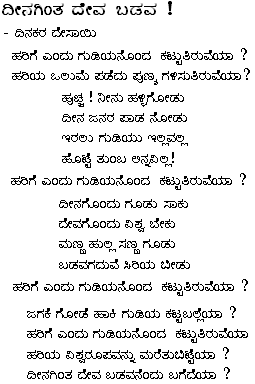Remembering Dinakar Desai (1909-1982)
by Dr. Jyotsna Kamat
First Online: May 16, 2006
Page Last Update: December 07, 2024
Dinakar means "One who makes the day" or the sun. Dinakar Desai was indeed like a sun to North Kanara district, which was dark due to abject poverty, and educational backwardness. As an educationist, social reformer, political activist, member of parliament and writer, he helped change the face of the district. Today North Kanara is in frontline along with South Kanara in literacy in Karnataka State. This was possible, as Shivaram Karanth the great litterateur, rightly observed, due to one-man-mission of Dinakar Desai. What the Christian missionaries did in early years of 19th century in South Kanara, Desai managed to achieve in North Kanara. But he is more famous as a poet, for introducing four liner limericks, called 'chutaka' in Kannada a format, now adapted by several Kannada poets. He is known as 'Chutaka-Brahma' (Creator of the Chutakas).
Dinakar Desai was born in 1909, son of a primary school teacher in a small village of Hondakkal near Kumta in North Kanara district. He lost his mother in childhood and was brought up by his grandmother. His father used to prepare ropes of coconut fiber, in his spare time to subsidize his pittance salary of seven rupees a month!. All round, Desai observed nothing but abject poverty. His family was surrounded by much poorer communities of Halakkis, Agers and Mukris who could hardly manage one square meal a day. He turned a socialist at a very young age.
K.L. Kamat/Kamat's Potpourri
Portrait of Dinakara Desai
Desai introduced the four-liner limericks in Kannada langauge
A gifted poet, he started writing in Konkani, his mother-tongue in his twenties. The poems, satirical pithy and humorous became immensely popular. Never published in a collection from, they spread throughout the district from mouth to ear, sung by young and old alike. Konkani had remained only a spoken language, over centuries with no publishers or readers. His complete poems in Konkani came out in collection form only in 1981 a year before his death! But by then, his songs attained the status of folksongs, virtually the author remaining unknown.
Desai excelled in every adventure he undertook. He stood first in history, the subject he offered for graduation. He opted for M.A. by Thesis. His study, 'Mahamandaleshwaras (Governors) of Chalukyas of Kalyana' is the authoritative work on the subject till date. He became member of Servants of Indian Society founded by Gopalkrishna Gokhale early in life. The members take oath to serve their motherland for life without taking any remuneration.
Desai lived and died poor, without owning even a small house. But he provided livelihood to millions, better lot to thousands of tillers and education to hundreds of thousands of poor children to earn a living.
He started a Kannada language weekly 'Jansevak' at Ankola, his center of activities, to create social and political awareness. Many intellectuals including late Gourish Kaikini, contributed regularly to the magazine. 'Chutakas' of Dinakar awaited eagerly by the readers, were lapped up and relished every week.

"Lord is Poorer than Destitute!" -- A Famous Poem by Dinakara Desai
As a young man, Desai led an organized resistance of the dock workers at Bombay and London ports, against subhuman working conditions. It drew the notice of British authorities and improvements were quick.. Later the movement of farmers he led in North Kanara against the exploitation by landlords is a historical event, leading to the reform of "Land to those that till" (Ulvavnige nela). Desai's limericks and songs were sung to the accompaniment of Gumte Pang (a native drum, a.k.a. Gumate Pak) during farmer's meetings - which drew crowds. He collected money due to his public contacts in Bombay - only to open new schools and other institutions in remotest villages of the district.
The "Kanara Welfare Trust" started by Dinakar Desai, celebrated Golden Jubilee recently. It has today 37 schools in 18 centers with more than 10,000 students. The man Dinakar indeed brought sunshine to umpteen number of down trodden. He served a Member of Indian Parliament for one term. He was defeated twice in his own constituency --due to ignorance of the people and India's notorious caste politics.
![]()
See Also:

